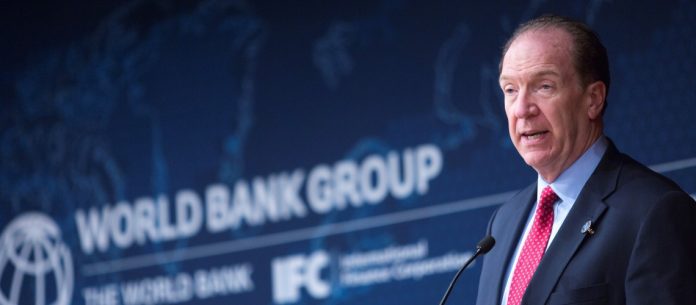The World Bank has just released its voluminous annual report CPIA, the Assessment of Policies and Institutions in Africa. It underlines the delays, sometimes the errors, of African countries and endorses certain progress, such as that of Togo.
In the news, the World Bank’s CPIA 2020 report is captioned “Safeguarding human capital before and after Covid-19”. The CPIA is presented as a diagnostic tool for countries that can benefit from IDA (International Development Association) funding.
It gauges the quality of political and institutional structures, their capacity to support sustainable growth and reduce poverty. From sixteen indicators grouped into four categories, countries are rated on a scale of 1 (lowest score) to 6 (highest score).
The objective is to inform the public authorities on the impact of the efforts made to support growth and fight against poverty. The scores obtained are also used to determine the volume of concessional loans and grants granted by the World Bank (WB).
The 2020 report covers 39 countries, following the integration of Somalia this year. With regard to the criteria adopted, the countries of sub-Saharan Africa are lagging behind, but the WB notes progress, for example in Togo. The institution is nevertheless worried about the Covid-19 pandemic, not so much by its direct devastation as by the economic and social delays it causes.
“The report highlights the need for IDA countries to act to strengthen their health systems, protect their human capital, improve public sector governance and implement structural reforms aimed at boosting productivity.”
The overall score for Sub-Saharan Africa stands at 3.1, a score that has been almost stable since 2016. Once again, Rwanda takes the lead in the ranking, with an overall score of 4. These results “underscore the need to highlight is implementing a sustained process of economic and institutional reforms”, comments the WB.
Poor health coverage!
The rest of the ranking, close to that of 2019, assigns a score of 3.8 for Cape Verde. The archipelago is followed by Kenya, Senegal and Uganda (score of 3.7). Benin and Ghana both saw their overall score rise from 3.5 to 3.6.
The WB notes that the countries at the top of the CPIA ranking are also those which have the most dynamic economies in the region. Most of the fifteen countries with below-average scores are fragile states.
In 2020, the IDA countries of sub-Saharan Africa had to deal with the Covid-19 pandemic when they were “ill-prepared to manage such a health crisis”.
The observation of the WB is clear: these countries have “low health coverage”, insufficient public spending in health and the high level of costs borne by patients.
Overall, they have significant flaws in their ability to prevent, detect and respond to an emergency. “Their health systems generally suffer from serious deficiencies in terms of health care capacity in clinics and hospitals, deployment of health workers, access to care and infection control practices.”
However, the relatively low number of cases in the region helps limit the spread of the virus by adopting and expanding screening, tracing and isolation measures. Massive and early investments in health systems reduce the risk of later adopting strict containment measures.
Which, given the characteristics of these economies, would have significant repercussions on the livelihoods of the populations, notes the WB, which alludes to informal work.
States do not remain inactive, welcomes the WB. In particular, the number of public service support measures is higher in the Africa region. These measures include the adoption of subsidies to public services, the deferral or elimination of charges for basic services, such as the elimination of electricity tariffs announced by the government of Niger.
By focusing on preserving their human capital today, African countries will be able to recover and continue to grow after the pandemic. “They will need to implement policies to support vulnerable households, protect livelihoods, ensure access to education and strengthen digital connectivity.”
Better debt management!
Regarding the first category of criteria, which relates to economic management indicators, the regional average scores have hardly changed, reflecting the progress made in fiscal policy and debt management.
The region retains its score of 3 out of 6 for fiscal policy, thus entering a process of financial stabilization, including for debt management, after years of deterioration. Indeed, many countries have adopted a national medium-term debt strategy and have increased their implementation capacities, with the key to strengthening debt management functions.
Public debt vulnerabilities remain significant, however, with many countries at high risk of debt distress. The WB sanctions “inconsistencies between monetary policy frameworks and price stability objectives”.
Likewise, the institution regrets “the deterioration of the trade policy framework as well as the continued weakening of the financial sector” in several countries. In addition to health, the area of ”public sector management and institutions” continued to decline in 2019. The WB notes poorer performance in terms of the efficiency of revenue mobilization and the quality of public administration.
The so-called “fragile” countries also score particularly lower with regard to property rights and governance rules.
To avoid a food crisis in the region, recommends the WB, “it would be important to minimize disruption to essential intra-African food supply chains and keep logistics open”.
Governments must take action to reduce trade barriers and allow the agrifood chain to operate smoothly. Funding for agribusiness must be protected. Early warning systems for food shortages and associated emergency supply systems will need to be adjusted to pay more attention to rural and urban areas.
“Regressive taxes” on mobile money!
Digital technologies can help anticipate challenges, alleviate shortages, and strengthen the resilience of food chains. Preserving transport and logistics services along major corridors will therefore be of critical importance, especially for landlocked countries.
When it comes to digital technology, the WB is surprised at the “regressive taxes” decided by certain countries on mobile money. These taxes disproportionately affect low-income people who primarily conduct low-value transactions. The WB applauds the Central Bank of West African States, which has reduced or eliminated such charges.
After tackling the immediate health crisis, countries must undertake reforms aimed at improving productivity as a priority. This includes encouraging the reallocation of resources to more productive sectors, fostering the adoption of technology and innovation, and promoting a macroeconomic and institutional environment conducive to growth.
Togo, a good student!
Of the six countries whose overall score increased, three (Chad, Nigeria and Zimbabwe) are fragile and conflict-affected countries. Non-fragile countries include Benin, Ghana and Togo. The increase in the overall score of these countries demonstrates progress in the quality of economic management (Benin and Chad), structural policies (Ghana and Zimbabwe), the fight against social exclusion (Chad, Nigeria and Togo) and public sector management (Togo and Zimbabwe).
Togo has become a “high performing” country, as evidenced by its overall CPIA score which, over the past three years, has increased, and stands at 3.3 in 2019.
Togo appears to be a great reformer, with progress in a whole series of political areas. For example, the tax base was broadened with the introduction of a new tax code, which reduced the number of withdrawals from 26 to 17. The WB welcomes the creation of a single account dedicated to the payment of loans. VAT. As well as the generalization of the statutory VAT rate at 18%.
In the area of tax administration, in addition to the establishment of a single identification system for taxpayers to facilitate internal controls and fight against corruption, electronic procedures have been encouraged. They reduce the compliance costs for taxpayers and facilitate voluntary tax declarations.
The cadastral services have been modernized, and the national customs and fiscal databases harmonized. These measures have reduced the time required to comply with tax obligations by 57 hours, reduced tax exemptions from 3.5% to 1.8% of GDP and increased the number of taxpayers by 23.6%.
Reference: https://magazinedelafrique.com/african-banker/lafrique-scannee-par-la-banque-mondiale/































